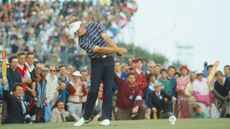What Have The Initial Reactions To The World Handicap System Been?
How has the new system been received to this point?


We consider early reports and feedback from golfers across the country following the November implementation of the World Handicap System.
What Have The Initial Reactions To The World Handicap System Been?
Over recent months we’ve written extensively about the workings and implementation of the World Handicap System (WHS), the latter of which occurred on 2nd November 2020.
Moving from a method based on aggregate to one based on average scoring has possibly been the most significant ever change to how golf handicaps are calculated in this country.
Through our various channels we’ve been in a good position to gauge initial reactions to the roll-out of the WHS and to assess concerns about the new system.
Even at this early stage, we have some evidence of how things have changed and might change in future.
Going up or coming down?
Get the Golf Monthly Newsletter
Subscribe to the Golf Monthly newsletter to stay up to date with all the latest tour news, equipment news, reviews, head-to-heads and buyer’s guides from our team of experienced experts.
From a poll conducted on the Golf Monthly Forum, 49% of respondents said their Handicap Index had come down with the implementation of WHS and only 20% had gone up.
In the main, it seems lower handicappers who perform consistently have come down, as have those with a few recent good rounds in their last 20.
But there are others, who’ve endured a poor season who have seen their Handicap Index jump considerably from the previous system.
Whether individuals are dissatisfied or accepting of their new number, WHS does seem to deliver an Index that’s more reflective of current play for those who put scores into the system on a frequent basis.
Will the average golfer play ball?
Putting more counting scores in was a key objective and it’s important individuals do this to make sure their Handicap Index is as reflective as possible. That’s why casual games can now be counting.
But for many in this country, their way of playing is so ingrained that it may take time to alter. Some may never alter.
As it’s not mandatory to post a score for handicap in bounce games, early reports suggest many won’t do it. They’ll continue to leave counting rounds to competitions only.
To what effect?
There’s concern that could mean those golfers have Handicap Indexes that are not so representative of their current playing ability compared with those who do record the majority of social games. And that could work in the competitive favour of the former group.
Most players feel more comfortable in bounce games and score better as a result. By putting more, better scores in from social games, their Handicap Index will come down.
That could put them at a disadvantage in competitions, when they go up against players who only record, generally poorer, competition scores for WHS.

Big swings
From early evidence it seems those who post frequently could see big swings in handicap in short spaces of time.
Players who had three or four counting scores near the bottom of their most recent 20 at WHS quick off, quickly bumped them out.
Those who did so with poor rounds saw swift significant hikes. Likewise, there were tales of others who threw in a couple of good rounds and saw big reductions in quick time.
Given we’re used to going up no more than 0.1 per round, and coming down in relatively small segments, getting used to such variations will take time and could prove complicated for certain competitions (particularly those running over the course of a season.)
Where’s Buffer?
Another reported concern from competitive golfers is the removal of the “Buffer Zone” as a concept.
For many, the battle to make buffer was one of the most compelling (secondary) challenges in competitive golf. Trying to save a respectable score and avoid a 0.1 increase.
With the new system, the incentive is not as straightforward. If you know a game will not replace one of your counting rounds, the motivation to keep trying when the chips are down is not so compelling.
But, if your form dips, it could still end up as one of your best eight, so it’s worth persevering… It might take a little time for that concept to sink in.
Slippery slopes
There has been plenty of initial debate about the correctness of Slope Ratings at clubs up and down the country – “How can my course be rated the same as ‘that’ course which is so much more difficult?”
Inevitably there will be discrepancies and the governing bodies will need to review their ratings after a period of time.
It should be said that the Slope Rating is the difference in difficulty between a scratch and bogey player, and the Course Rating is a better assessment of a golf course's difficulty.
With that in mind, it should be stated that this article has been written very much as the title says, based on the initial reactions to the WHS. Like any change of significance, it will take time to bed in and for people to become accustomed.
In a year’s time, at the end of (hopefully) a full playing season, we’ll have a complete collection of data and evidence to give a more comprehensive analysis of how WHS has affected competitive golf in this country.
It’s going to be an interesting playing year. Watch this space.
For all the latest equipment news and reviews, be sure the follow Golf Monthly on Facebook, Twitter and Instagram.

Fergus is Golf Monthly's resident expert on the history of the game and has written extensively on that subject. He has also worked with Golf Monthly to produce a podcast series. Called 18 Majors: The Golf History Show it offers new and in-depth perspectives on some of the most important moments in golf's long history. You can find all the details about it here.
He is a golf obsessive and 1-handicapper. Growing up in the North East of Scotland, golf runs through his veins and his passion for the sport was bolstered during his time at St Andrews university studying history. He went on to earn a post graduate diploma from the London School of Journalism. Fergus has worked for Golf Monthly since 2004 and has written two books on the game; "Great Golf Debates" together with Jezz Ellwood of Golf Monthly and the history section of "The Ultimate Golf Book" together with Neil Tappin , also of Golf Monthly.
Fergus once shanked a ball from just over Granny Clark's Wynd on the 18th of the Old Course that struck the St Andrews Golf Club and rebounded into the Valley of Sin, from where he saved par. Who says there's no golfing god?
-
 Five Fabulous Scottish Courses You May Not Know
Five Fabulous Scottish Courses You May Not KnowAlongside the nation’s global superstars, there are many extremely strong but slightly less famous courses often missed by touring golfers
By Rob Smith Published
-
 I'm A Golf Historian And Here's Why I Think Sandy Lyle (Not Tiger Woods) Is The Greatest Ball Striker Of All Time
I'm A Golf Historian And Here's Why I Think Sandy Lyle (Not Tiger Woods) Is The Greatest Ball Striker Of All TimeFergus Bisset writes here on the best ball-strikers in the history of the game. His pick for the best of the best might be a surprise to some.
By Fergus Bisset Published